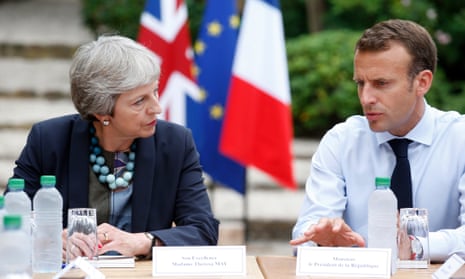The Cabinet Office minister, David Lidington, has warned that relations between Britain and France are at “a fork in the road” – and the only alternative to the prime minister’s Chequers plan is a no-deal Brexit.
Ministers are concerned the French government remains deeply sceptical about the approach spelled out in its July white paper, prompting Theresa May to fly to Emmanuel Macron’s holiday home earlier this month to try to win the president over.
In a speech delivered to French business leaders on Wednesday afternoon, Lidington, who in effect serves as May’s deputy, warned it was too late to go back to the drawing board.
“With exactly seven months until the end of the article 50 process and less than two months ahead of the October European council we face the choice between the pragmatic proposals we are discussing now with the European commission, or no deal,” he said.
His speech amounted to the clearest explanation by a senior minister of why the government believes the Chequers approach, with its common rulebook for goods and looser relationship for services, is the right one – and what the risks of rejecting it would be.
Stressing the common values and interests of the UK and France, he said: “I truly feel that we are at a fork in the road. There are trends on both sides of the Channel, both sides of the North Sea, and both sides of the Atlantic that could see us drift apart.”
Lidington underlined the “hard-fought compromise” made to reach the government’s current position – including the resignation of two cabinet ministers – and said “the alternative models do not meet the level of ambition or the outcome we all want to see delivered”.
The former Europe minister also struck a reassuring note, insisting the government’s approach would prevent Britain from undercutting the continent’s businesses, by slashing red tape or subsidising failing firms.
“Our proposals would ensure a level playing field – with commitments on areas like state aid, environmental, social and employment protections and other regulatory standards.”
He added: “We understand that the EU is concerned that we could lower our standards to gain a competitive advantage. But these concerns are completely unfounded. Like France, we view economic growth, consumer and worker protection and sustainable development as going together hand in hand, not as trade-offs.”
That is likely to concern some Brexiters, for whom leaving the EU should be an opportunity to cut back on what they see as cumbersome regulation.
The commitment not to flout the EU’s approach to state aid may also worry Labour, with Jeremy Corbyn keen to exploit the added leeway Brexit could allow to provide more support to struggling industries.
Lidington stressed that the Chequers approach would involve “a robust dispute resolution mechanism to allow for a means of redress if the UK does not fulfil its obligations”.
He denied the government’s proposals amounted to having its cake and eating it, using the French expression “avoir le beurre et l’argent du beurre – et mème le sourire de la crémière”.
The Chequers plan is causing considerable anxiety among Conservative MPs, who fear that a close continuing relationship with the EU, alongside the £40bn exit bill, will smack of backsliding to Leave voters.
But in remarks directed as much at Tory colleagues as at his audience at the French equivalent of the CBI, Medef, Lidington laid out why he said the government had rejected the alternatives.
He said attempts to amend recent Brexit legislation to secure a closer relationship, such as membership of the European Economic Area (EEA), or of the EU customs union, had been rejected by the House of Commons.
“Membership of the EEA would entail continuing to accept freedom of movement and remaining in the customs union would undermine our ability to sign FTAs with other countries,” Lidington said.
And he suggested an agreement based broadly on Ceta, the Canada-EU free trade agreement, as favoured by the former Brexit secretary David Davis, would not allow the government to “deliver in full on our commitments to the people of Northern Ireland” by avoiding a hard border.
